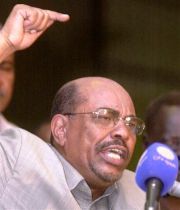Sudan’s NCP accuses SPLM of failing to implement CPA
October 15, 2007 (NAIROBI) — Sudan on Monday denied the claims that it was dragging its feet on implementing the landmark north- south peace deal, saying a lot of progress has been achieved since the inking of the deal to end the civil war in Africa’s largest country two years ago.
 In a statement from the Sudanese Embassy in Nairobi, Khartoum accused the former rebel Sudan Peoples Liberation Army (SPLA) of violating a peace accord which ended the protracted civil war in the South, saying its sustained military spending was worrying.
In a statement from the Sudanese Embassy in Nairobi, Khartoum accused the former rebel Sudan Peoples Liberation Army (SPLA) of violating a peace accord which ended the protracted civil war in the South, saying its sustained military spending was worrying.
Khartoum gave a 45-page progress report of measures taken to implement the Comprehensive Peace Accord (CPA) and accused the SPLA of failing to allow peace monitors to scrutinize its compliance with the peace deal.
Khartoum said in the statement that the SPLA had refused to give specific information and maps required by the Ceasefire Monitoring and Joint Military Committee (CJMC) to determine its troop’s deployment.
Sudanese authorities say they cannot guarantee that soldiers in SPLA camps who are discharged from service would not have access to heavy weaponry which in itself would render the entire demobilization and disarmament process futile.
Khartoum and its former rebel SPLA/Movement officials signed a peace agreement in Nairobi on 9 January, 2005, ending two decades of fighting over power and sharing of oil revenue but the peace process received a major blow last week when the SPLA/M suspending its participation in the country ‘s Government of National Unity.
SPLA officials said they suspended their participation in the unity government because major decisions were being taken without the approval of its ministers in the government.
However, Khartoum, responding to the move for the first-time since the walkout of its peace allies, said the reasons behind the SPLA walkout, under the pretext that it was dragging its foot on the deal were unfounded and instead accused the SPLA of failing.
It said SPLA’s failure to appoint officials to the powerful Petroleum Commission and five-month delays in arriving in Khartoum for talks on an interim constitution were to blame for the lapses in the implementation of the talks.
The SPLA is also hindering the safe return of the Sudan Armed Forces (SAF) soldiers who are not part of the 24,000-member Joint Integrated Units, from reaching their assembly process while also continuing mass recruitment of troops in ceasefire zones.
But the embassy dismissed the remarks, saying they have shown commitment to the implementation of the security arrangements pact although a few disagreements are still abound over technical details, which it said the government was still trying to resolve. Khartoum also accuses the former rebels of opening training camps in South Darfur while still recruiting troops in the Kordofan and Southern Blue Nile states, which has seen its military spending, occupy about 40 percent of overall spending in 2006.
“The SPLA continues to import heavy-weaponry in spite of the fact that the CPA has given priority to repatriation of refugees and the basic infrastructure,” the statement said.
The statement said the ruling National Congress Party (NCP) signed a joint cooperation agreement with the political wing of the SPLA in which the two sides vowed to work together on the successful implementation of the peace pact in 2006.
Khartoum also accuses the south of violating the country’s national security by issuing licenses to foreign telecommunication firms using the Ugandan dialing codes and the issuance of aviation licenses to foreign airlines, which was said a security threat by the Sudanese government.
(Xinhua)
